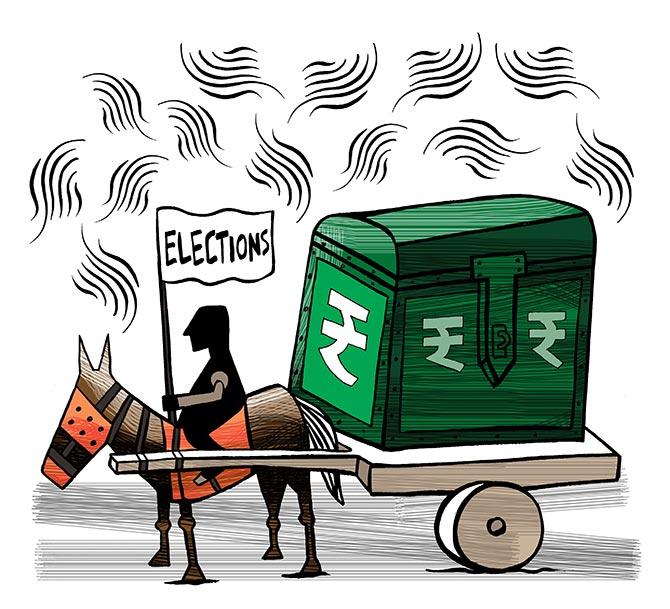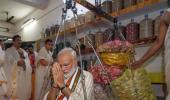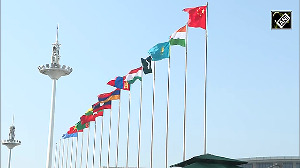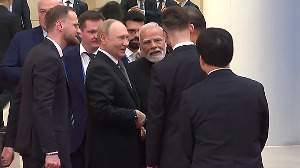'You cannot win an election without putting together a massive war chest.'
'It is impossible to put a war chest together, without giving and taking favours from India Inc, with a large dose of extortion thrown in,' says Devangshu Datta.
Illustration: Uttam Ghosh/Rediff.com

I voted for the first time in the 1984 elections when Rajiv Gandhi rode the sympathy wave following his mother's assassination.
As a 22 year old casting a paper ballot in what was then the Calcutta South constituency, I had an awful binary to consider.
I could vote for the Left Front, which ran the state very badly, and regularly indulged in violence and murder.
Or, I could vote for the Congress, which had just carried out a monstrous genocide.
Every election since then has presented similarly terrible choices.
My ideal political party would combine an ideology of being socially liberal and inclusive, with a near-libertarian perspective on the economy.
It would guarantee wide-ranging personal freedoms; it would delete vast chunks of the tax codes and abolish the licensing system; and it would abjure corruption and political violence.
No such animal exists. Indeed, such an animal cannot exist. You cannot win an election without putting together a massive war chest.
It is impossible to put a war chest together, without giving and taking favours from India Inc, with a large dose of extortion thrown in.
You cannot win elections without muscle power.
So every party has corruption and the capacity for violence embedded in its DNA.
Nor would a socially liberal agenda make sense as a political plank.
People would not vote for it, even if they did not actively oppose it.
Yet, India remains a place where many personal freedoms are trammelled by bizarre laws.
The Indian Constitution is a wonderful document in many ways.
Unfortunately, it was pasted on top of a codex of colonial-era laws designed to keep the lid on the population.
Over time, in the name of religious sensitivity, even more regressive provisions have been added on.
Provisions such as criminal defamation and sedition were designed to crush challenges to the Raj.
They have never been softened by any government that has been in power in the eight decades since Independence.
Indeed they have been used recently by politicians as well as business groups, to counter everything from satirical memes and cartoons to allegations of sexual harassment and corruption.
While those laws exist in their current forms, freedom of speech is constrained.
Freedom of speech is further constrained by the sections of the Indian Penal Code, which makes it impossible to criticise religion, even on legitimate grounds.
Those laws are applied selectively, depending on the proclivities of the government of the day.
Nonetheless, they exist and no government has diluted either Section 295A or Section 153 of the IPC and no government appears likely to touch these provisions.
That's a further constraint on freedom of speech, and arguably, on the freedom to practice a lack of religion.
Other limits on personal freedom also exist. There is still no privacy law.
That is not going to be a priority for legislators, given that the government has argued strenuously against the right to privacy.
In large parts of the country, there are further constraints on personal habits.
It is illegal to consume alcohol or eat beef, in many states, for instance.
Those proscriptions are driven largely by religious considerations and again, no political party is willing to push for the abolition of such regressive laws.
Even in states where prohibition has been repealed, it has been done quietly and justified on the utilitarian grounds of raising revenue. (That is, by the way, an excellent reason for not imposing prohibition).
Even an avowedly majoritarian Hindu party has not considered pulling cannabis out of the purview of the Narcotic and Psychotropic Substances Act.
This makes it look like an outlier in a world, where many major nations have legalised cannabis in the last five years.
So who does one vote for, when no political agenda comes within touching distance of the ideal?
I've always cast my vote on the principle of doing least harm: I give it to the party that might cause the least harm on the social, economic, or personal liberties front.











